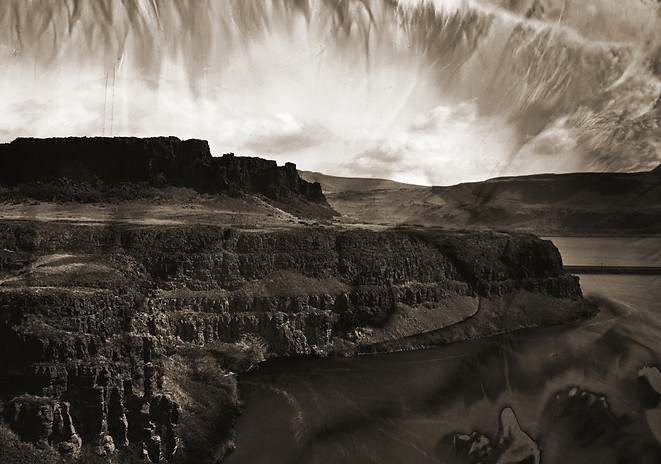MICHAEL HANSON

THE WAY WEST
MICHAEL HANSON
Years ago I read Timothy Egan’s book, Short Nights of the Shadow Catcher, about the life and work of photographer Edward Curtis and I was drawn to these old scenes of a changing western America. The images of Native Americans fishing or on horseback reappear in my head. I drive around the West and wonder what it must have looked like 125 years ago.
In 2020, Covid had hit and I had some free time. I wasn’t nearly traveling as much. I started tinkering with Wet Plate Photography. It’s slow and cumbersome. It stains my skin. it’s hard to get the smell out of my clothes. It’s a finicky process with nasty chemicals but there’s mystery in it. The images never quite do what I want. There’s wind and rain and humidity and I’m developing them in the back of my truck but it slows me down and makes me a little more deliberate and thoughtful. And I began to enjoy the idea of combining a modern landscape with a centuries-old technique.
I remember driving over the hills and looking down on the Columbia River Gorge. It’s undeniably beautiful. Steep cliffs, volcanoes, a massive ribbon of water sinking slowly to the Pacific. But it’s also quite altered. There’s a river under that lake. And buried communities, cultures and a history. If you look in the right spots though you can still see remnants of that past. I wanted to make a series that felt richer than just the surface. I don’t know if I can define it. When I see a messy image with these irreversible flaws and mistakes in a way it feels appropriate. And maybe it’s completely personal and we all see the river and the landscape differently but I do like the way the images are not perfect.
I think the images require us to consider the context and history of a landscape. You could almost imagine the buried layers of time being reveled in an unclear and somewhat tarnished way. Though to be honest, I’m not sure if I’m chasing an image or experience through this process. Setting up the camera, focusing on a tree or a cliff or a river. Being forced to wait for chemicals to react and being surprised at what I appears on a piece of glass brings me joy. Often times, the final image barely reflects how I originally saw the scene. So maybe that mystery of our common history is what I'm seeking.









